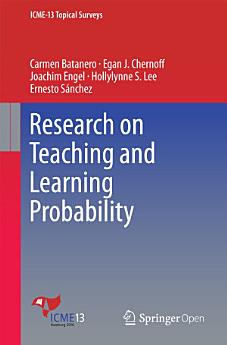Research on Teaching and Learning Probability
জুলাই ২০১৬ · Springer
৪.০star
৫ টা পৰ্যালোচনাreport
ইবুক
33
পৃষ্ঠা
reportমূল্যাংকন আৰু পৰ্যালোচনা সত্যাপন কৰা হোৱা নাই অধিক জানক
এই ইবুকখনৰ বিষয়ে
This book summarizes the vast amount of research related to teaching and learning probability that has been conducted for more than 50 years in a variety of disciplines. It begins with a synthesis of the most important probability interpretations throughout history: intuitive, classical, frequentist, subjective, logical propensity and axiomatic views. It discusses their possible applications, philosophical problems, as well as their potential and the level of interest they enjoy at different educational levels. Next, the book describes the main features of probabilistic thinking and reasoning, including the contrast to classical logic, probability language features, the role of intuitions, as well as paradoxes and the relevance of modeling. It presents an analysis of the differences between conditioning and causation, the variability expression in data as a sum of random and causal variations, as well as those of probabilistic versus statistical thinking. This is followed by an analysis of probability’s role and main presence in school curricula and an outline of the central expectations in recent curricular guidelines at the primary, secondary and high school level in several countries. This book classifies and discusses in detail the three different research periods on students’ and people’s intuitions and difficulties concerning probability: early research focused on cognitive development, a period of heuristics and biases programs, and the current period marked by a multitude of foci, approaches and theoretical frameworks.
মূল্যাংকন আৰু পৰ্যালোচনাসমূহ
৪.০
৫ টা পৰ্যালোচনা
এই ইবুকখনক মূল্যাংকন কৰক
আমাক আপোনাৰ মতামত জনাওক।
পঢ়াৰ নির্দেশাৱলী
স্মাৰ্টফ’ন আৰু টেবলেট
Android আৰু iPad/iPhoneৰ বাবে Google Play Books এপটো ইনষ্টল কৰক। ই স্বয়ংক্রিয়ভাৱে আপোনাৰ একাউণ্টৰ সৈতে ছিংক হয় আৰু আপুনি য'তে নাথাকক ত'তেই কোনো অডিঅ'বুক অনলাইন বা অফলাইনত শুনিবলৈ সুবিধা দিয়ে।
লেপটপ আৰু কম্পিউটাৰ
আপুনি কম্পিউটাৰৰ ৱেব ব্রাউজাৰ ব্যৱহাৰ কৰি Google Playত কিনা অডিঅ'বুকসমূহ শুনিব পাৰে।
ই-ৰীডাৰ আৰু অন্য ডিভাইচ
Kobo eReadersৰ দৰে ই-চিয়াঁহীৰ ডিভাইচসমূহত পঢ়িবলৈ, আপুনি এটা ফাইল ডাউনল’ড কৰি সেইটো আপোনাৰ ডিভাইচলৈ স্থানান্তৰণ কৰিব লাগিব। সমৰ্থিত ই-ৰিডাৰলৈ ফাইলটো কেনেকৈ স্থানান্তৰ কৰিব জানিবলৈ সহায় কেন্দ্ৰত থকা সবিশেষ নিৰ্দেশাৱলী চাওক।




